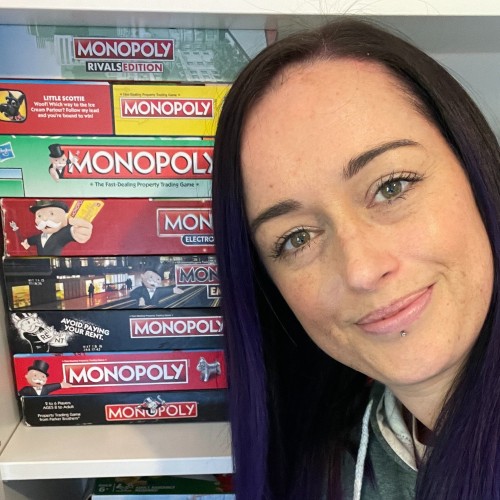Most of the properties in Monopoly work the same way. Typically you buy a space, and then charge a set rent fee every time someone lands on it. Then you increase that rent by buying other properties in that color set, or trading to get them, until you can buy houses and hotels.
But the Monopoly utilities are different, including the Water Works. It shares some similarities, but it doesn’t follow the same rules as the other spaces in terms of rent and house building.
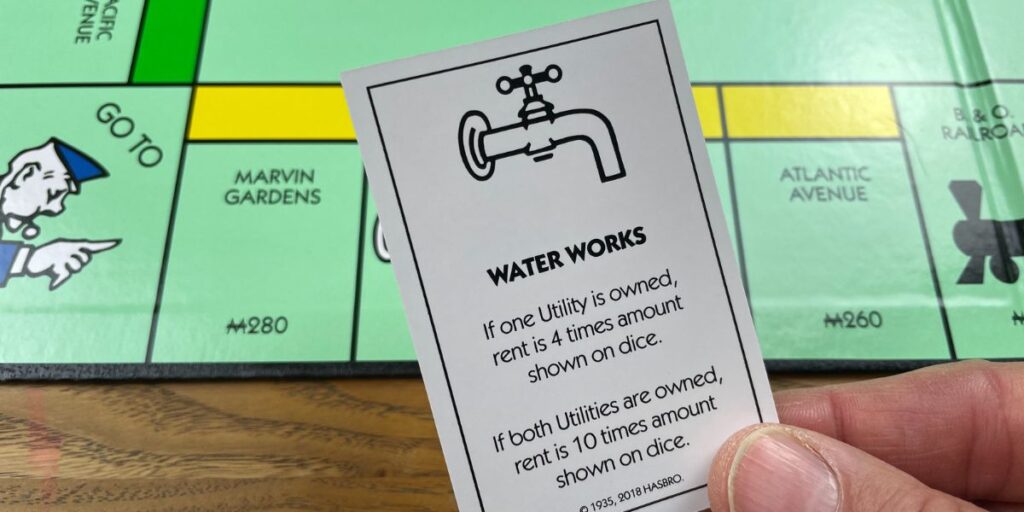
Some people think that the Water Works is a key property to get sewn up quickly. Others avoid it every game. Which is the right tactic?
In this guide I’ll explain everything you need to know about the Water Works, and give you some tips to help you decide whether it’s a property worth chasing.
What is Water Works in Monopoly?
The Water Works is a utility property in Monopoly. It is one of only two properties in the game that you cannot build on – instead, rent is charged based on the dice roll of the player landing on the space. It is the second utility in the game – the other is the Electric Company.
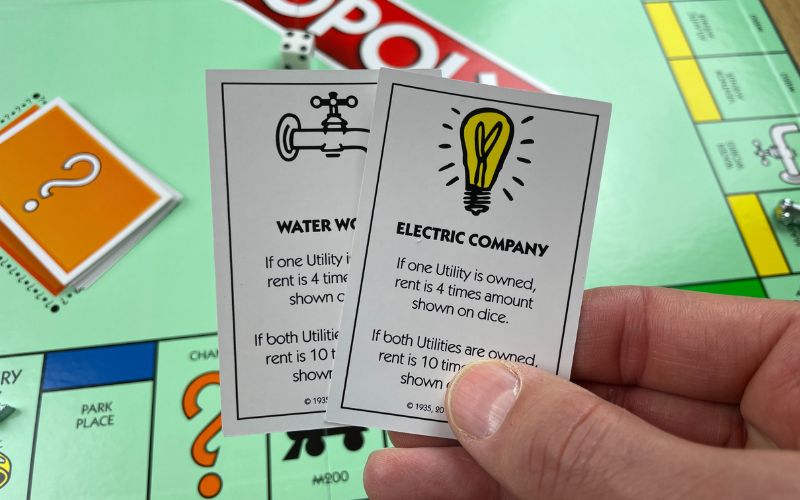
The Water Works and the Electric Company are two spaces that won’t generate a large income, but they do have their uses in the game. I’ll take you through some strategy tips below.
Where is the Water Works on the Monopoly board?
The Water Works property is situated on the third side of the board, between two yellow properties – Ventnor Avenue and Marvin Gardens.
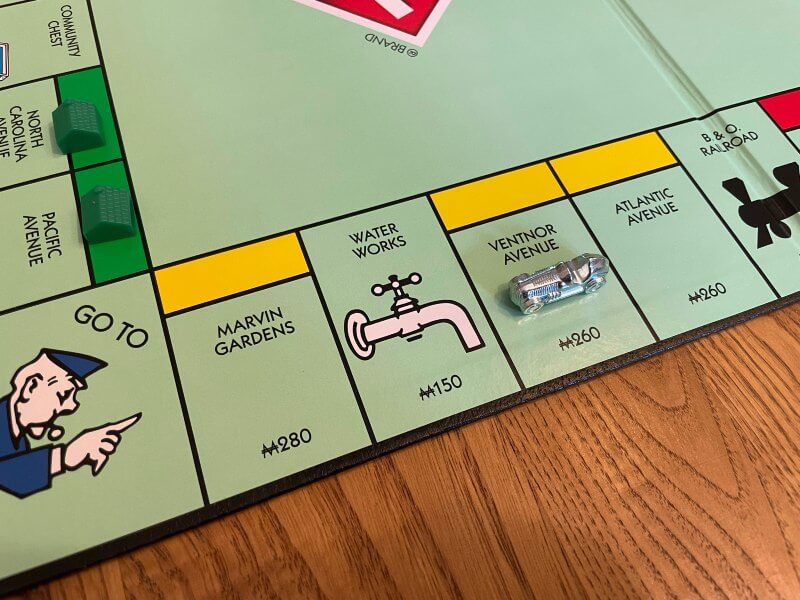
It’s an interesting position as it is 18 spaces after Jail. Jail is one of the most commonly-visited spaces on the board, because as well as landing on it naturally, there are also Chance and Community Chest spaces that send you there, and the Go To Jail space too. Plus if you roll three doubles in a turn, you go to Jail.
So most people will land on jail more frequently than other spaces. The average dice roll in a game of Monopoly is 7, with 6 and 8 being the next most likely.
So it’s not inconceivable that people will land on Water Works with some regularity, if they were to throw three sixes in a row, or a combination of a 7, 6 and 5 or similar.
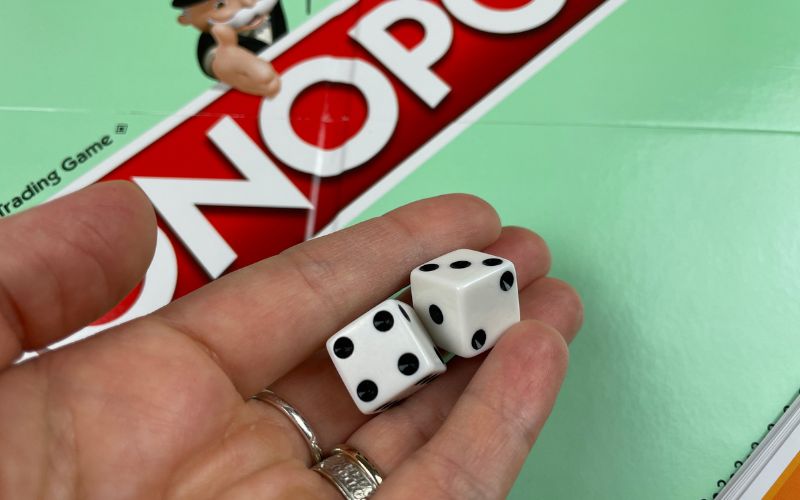
The position also means you’re unlikely to be able to snag Water Works on turn one. As it is 28 spaces after the Go space, you would have to rely on rolling two consecutive high doubles and then rolling a third above-average number without hitting a third double and going to Jail.
How does Water Works work in Monopoly?
The Water Works property, and the Electric Company, work differently to other properties on the Monopoly board. Rent is not a standard fee, but instead varies depending on the roll of the player who landed on the space.
Plus the only way to increase the rent you get from Water Works is to buy Electric Company, or to trade so that you have the complete set. There are no other ways that you can increase the rent due for landing on Water Works.
Otherwise, Water Works is exactly like other properties – you must buy it when you land on it, or if not it goes to auction. You can trade it, and you can mortgage it if you need funds – paying the mortgage fee plus 10% to unmortgage it at any time.
The utilities count as a property set in other games too, such as Monopoly Deal or Monopoly Bid. So they are often one of the most sought-after properties in those games, since they only require two properties to complete the full set.
How much do you pay if you land on Water Works in Monopoly?
When a player lands on the Water Works, if the person who owns it only owns that utility, the player must pay rent to the sum of 4 multiplied by their dice roll. If the owner has both utilities, then the multiplier is 10, not 4.
So let’s look at some examples.
The lowest roll possible in a game of Monopoly is 2 – a double 1. If a player starts on Atlantic Avenue and rolls a 2, they will land on Water Works.
If the owner does NOT own Electric Company, that means the multiplier is 4
So the dice roll of 2, multiplied by 4 = $8 rent owed.
If the owner has both the Water Works AND the Electric Company, then the multiplier is 10
A dice roll of 2, multiplied by 10 – $20 rent owed.
Now the best dice roll is 12 – double 6. If the player starts at St. James Place and rolls a 12, they will land on Water Works.
For owning just the Water Works, that’s 12 x 4 = $48. If the owner has both utilities, then it is 12 x 10 = $120.
Can you put houses on Water Works in Monopoly?
You can’t put houses on Water Works in a game of Monopoly. Neither the Electric Company or the Water Works properties can be built on. This means that once you own both utilities, you can’t grow the value of the properties at all.
This also means that the maximum rent you can ever charge for landing on the Water Works is $120, and that’s only with owning both utilities and if the player landing on the space has rolled a 12.
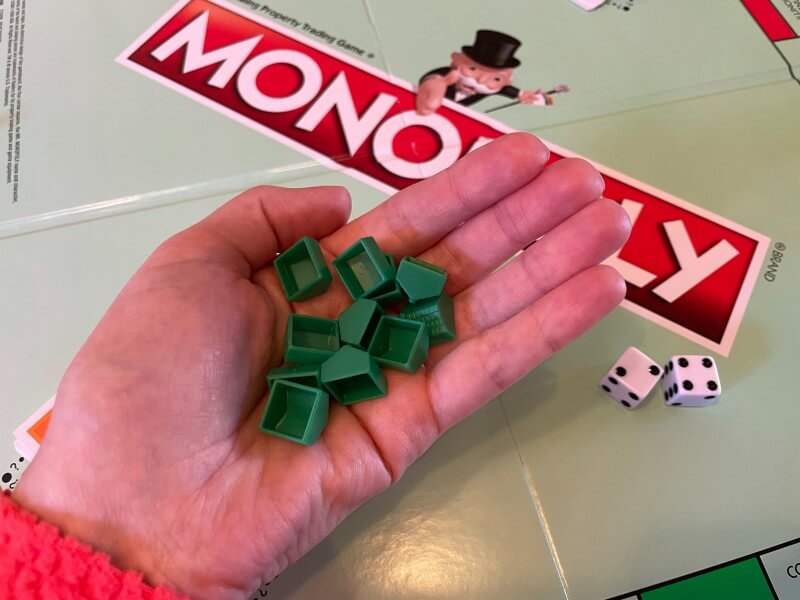
Is Water Works good?
The crucial question – is the Water Works a good property to buy, or is it not worth the cost?
There’s no definitive answer, but my advice is to buy it. And here’s why.
Firstly, return on investment. The Water Works costs $150, which makes it one of the cheapest properties in the game.
Let’s go back to that average dice roll again, which is 7. If you only owned the Water Works, that means the average rent payment you’ll receive every time someone lands on the space is $28 (7 x 4).
That means, to receive the cost of the property back, you only need an average of 6 players to land on the space during the game. 6 x $28 = $168, so you’d actually be $18 up.
If you own both utilities, that’s an outlay of $300, but then the average payment you receive goes up to $70 (7 x 10). So you only need 5 players to land on either utility to make the money back, and you’d get a $50 profit either way.
As a guide, here’s how many times each of the remaining properties need to be hit for you to break even:
| Property | Standalone cost | Standalone rent | No. of visits to break even | Cost of the set | Rent when set owned | No. of visits to break even |
|---|---|---|---|---|---|---|
| Mediterranean Avenue | 60 | 2 | 30 | 120 | 4 | 30 |
| Baltic Avenue | 60 | 4 | 15 | 120 | 8 | 15 |
| Oriental Avenue | 100 | 6 | 17 | 320 | 12 | 27 |
| Vermont Avenue | 100 | 6 | 17 | 320 | 12 | 27 |
| Connecticut Avenue | 120 | 8 | 15 | 320 | 16 | 20 |
| St Charles Place | 140 | 10 | 14 | 440 | 20 | 22 |
| States Avenue | 140 | 10 | 14 | 440 | 20 | 22 |
| Virginia Avenue | 160 | 12 | 14 | 440 | 24 | 19 |
| St. James Place | 180 | 14 | 13 | 560 | 28 | 20 |
| Tennessee Avenue | 180 | 14 | 13 | 560 | 28 | 20 |
| New York Avenue | 200 | 16 | 13 | 560 | 32 | 18 |
| Kentucky Avenue | 220 | 18 | 13 | 680 | 36 | 19 |
| Indiana Avenue | 220 | 18 | 13 | 680 | 36 | 19 |
| Illinois Avenue | 240 | 20 | 12 | 680 | 40 | 17 |
| Atlantic Avenue | 260 | 22 | 12 | 800 | 44 | 19 |
| Ventnor Avenue | 260 | 22 | 12 | 800 | 44 | 19 |
| Marvin Gardens | 280 | 24 | 12 | 800 | 48 | 17 |
| Pacific Avenue | 300 | 26 | 12 | 920 | 52 | 18 |
| North Carolina Avenue | 300 | 26 | 12 | 920 | 52 | 18 |
| Pennsylvania Avenue | 320 | 28 | 12 | 920 | 56 | 17 |
| Park Place | 350 | 35 | 10 | 750 | 70 | 11 |
| Boardwalk | 400 | 50 | 8 | 750 | 100 | 8 |
| Reading RR | 200 | 25 | 8 | 800 | 200 | 4 |
| Pennsylvania RR | 200 | 25 | 8 | 800 | 200 | 4 |
| B&O RR | 200 | 25 | 8 | 800 | 200 | 4 |
| Short Line | 200 | 25 | 8 | 800 | 200 | 4 |
This is only looking at rent without building – it doesn’t consider buying houses. But it shows you that the only properties which beat the Utilities for ROI are the railroads, and even then only when you own all four.
For most properties, you need to land on it at least 12 times to recover the price you paid, which is double that of the utilities.
Plus, you can quickly build up a potential rent of $120 just by owning two properties for a total outlay of $300.
Here’s what you need to do to generate $120 with all the other color sets:
| Color Set | How to earn $120 in rent | Minimum cost to achieve |
|---|---|---|
| Brown | 4 houses on Mediterranean Avenue, 3 houses on Baltic Avenue | $420 (3 houses on each with player landing on Baltic Avenue) |
| Light Blue | 3 houses on all properties | $620 |
| Purple | 2 houses on all properties | $1040 |
| Orange | 2 houses on all properties | $1160 |
| Red | 2 houses on all properties | $1580 |
| Yellow | 1 house on Marvin Gardens, 2 houses on all other properties | $1250 (1 house on each with player landing on Marvin Gardens) |
| Green | 1 house on all properties | $1520 |
| Dark Blue | 1 house on both properties | $1150 |
| Railroads | Own all railroads | $800 |
Again, we are only talking about potential rent because it relies on the player rolling 12 when landing on the Water Works, but it shows you that there is potential to earn a lot of money for a little outlay.
Early game, the utilities are definitely more useful. Later in the game, even with maximum rolls, $120 is not likely to be game-changing for you.
But here’s the reason why they’re so useful to own late in the game – they are essentially another Free Parking space for you.
When Monopoly games reach their later turns, most of the properties are owned and have houses, and each turn you’re hoping to avoid landing on an opponent’s space and having to pay out huge sums.
Owning Water Works means you get a cheap space that you don’t have to worry about. Sure other players might not be too worried either, since they won’t have to pay a lot, but it can just give you a breather if you’ve had a rough couple of turns for paying out rent.
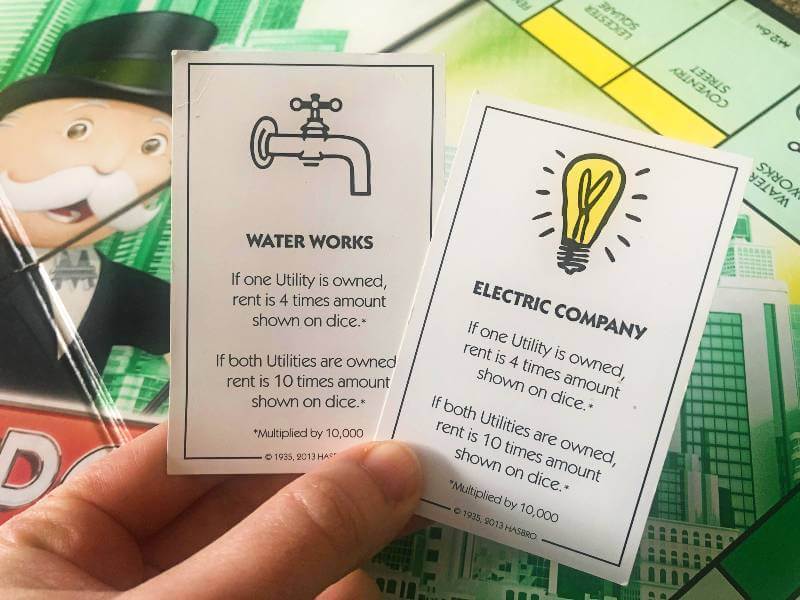
Final Word
So, is the Water Works a space worth buying? I really think it is.
It’s cheap, and in the early game you might get lucky and rake in a fair amount of rent, if players roll high. Plus, you won’t take long to make back the amount you spent, even if players roll low – it’ll be faster than other properties, anyway.
So you might not get huge sums from it, but it offers value because you end the game better off for having owned it.
If you choose not to buy it, you’ll keep your $150 but you won’t earn that amount during the game. You might end up paying that amount to the utilities owner in the long run! And you can always mortgage it if you end up short of funds.
If you’re playing with others who don’t seem to understand the value of the Water Works, maybe try declining it and winning it at auction for a lower fee too – that’s a great way of making it even better value.
Hopefully, you now see why it makes sense to buy the Water Works, and more importantly, you understand how the space works too!

